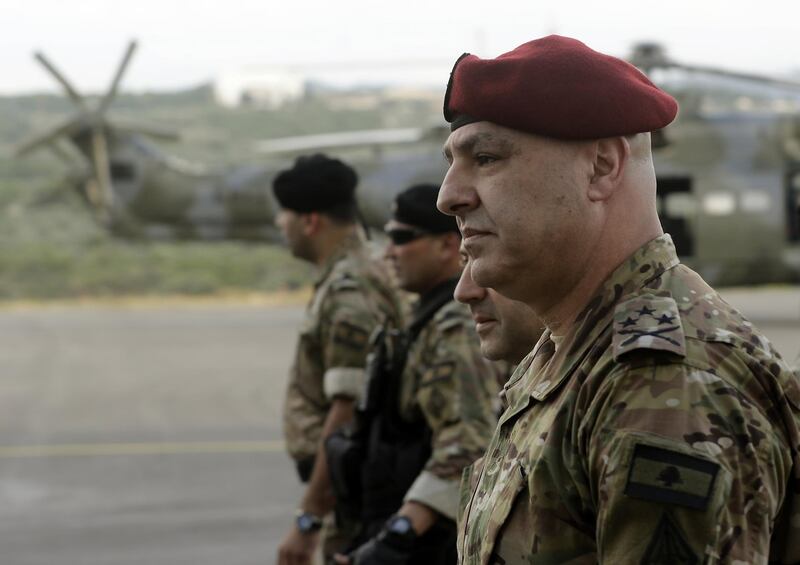Lebanon’s army chief arrived in Washington on Monday to discuss counterterrorism co-operation, aid to the Lebanese Armed Forces and his country's border security.
Gen Joseph Aoun, on his third official visit to the US capital since taking office last year, is expected to meet senior officials from the departments of state and defence – including Chairman of the Joint Chiefs of Staff Gen Joseph Dunford and Commander of US Central Command Gen Joseph Votel.
US military aid to Lebanon and security co-operation between Washington and Beirut will top Gen Aoun's agenda. Since 2006, the US has provided more than $1.5 billion (Dh5.5bn) in aid to the Lebanese Armed Forces, with an average of $70 million a year.
Firas Maksad, director of the Arabia Foundation in Washington, said that Gen Aoun's visit has been in the works for months and is part of regular co-ordination meetings between the military leaderships in both countries.
"It demonstrates continuity at a time when there is much speculation about US military assistance to Lebanon," he told The National.
Speculation is driven mostly by pressure from US politicians to review the aid package to Lebanon as means to counter the Iran-backed Lebanese militia, Hezbollah, which the US considers a terrorist organisation.
Bloomberg reported earlier this month that Republican Senator Ted Cruz attached an amendment to the Senate defence authorisation bill requiring the Pentagon and the State Department to assess how well the Lebanese army is meeting the terms of UN resolution 1701, which calls for the disarming of Hezbollah and other militias.
“Washington is monitoring the composition and policies of the incoming Lebanese government before making a determination about its approach," said Mr Maksad.
Hezbollah made slight gains in Lebanon's parliamentary elections last month, but that has so far not affected the balance of power in Beirut. Saad Hariri, a US ally, was designated as prime minister for a third time and is finalising consultations to form a new government.
______________
Read more
Lebanon's Hariri signals new government new government near
Michael Young: Lebanon must not get caught in the crossfire between Hezbollah and its critics
______________
US Secretary of State Mike Pompeo said following Lebanon's recent elections that the overall balance of power in Beirut will not be changed.
That was not necessarily a good thing, he said, “because the existing balance was not good” when it came to Hezbollah’s increasing influence.
Mr Pompeo did not anticipate major changes in the aid package to Lebanon but stressed that President Donald Trump's team will review the matter to “make sure we are doing this right”.
The Trump government seeks to increase pressure on Iran and its regional proxies, including Hezbollah. Several bills that would sanction the party are being discussed in Congress.
"The current trend lines [in Washington] are not encouraging,” said Mr Maksad. "There are a number of specific [US] requests put to the Lebanese authorities relating to the presence of foreign non-state actors on their territory.”
Last April, the Khaleej newspaper reported that families of senior Houthi leaders in Yemen have fled to Beirut. Forces of the internationally-recognised government of Yemeni President Abdrabu Mansur Hadi, backed by a Saudi-led coalition, have been battling the Iran-backed Houthis for more than three years.
The US is also looking for the Lebanese army to exert more control in the areas bordering Syria and to show more visibility in South Lebanon, a Hezbollah stronghold.
In this line, the US and the UK have led support for Lebanon's new Land Border Force that is now deployed in four regiments right along the Syrian border. Attention is now turning to the south where the Italian government has been coordinating with international partners and the Lebanese government for form a "model battalion" of the army that would be a unified body for that is deployed across the UN peacekeepers area of operations with a specific view to enforcing UNSC resolutions such as 1701.
However, one US official, who spoke to The National, said the Trump administrationis aware of the political and security constraints that the Lebanese Armed Forces operate under when it comes to pressuring Hezbollah. The government, he explained, is determined to continue funding for the army, but Gen Aoun's tough task will be in Congress.
Last week, the Senate overwhelmingly (85 to 10) voted on the National Defence Authorization Act (NDAA) to allow security border aid to “the Government of Lebanon for purposes of supporting and enhancing efforts of the armed forces of Lebanon to increase security and sustain increased security along the border of Lebanon with Syria".





